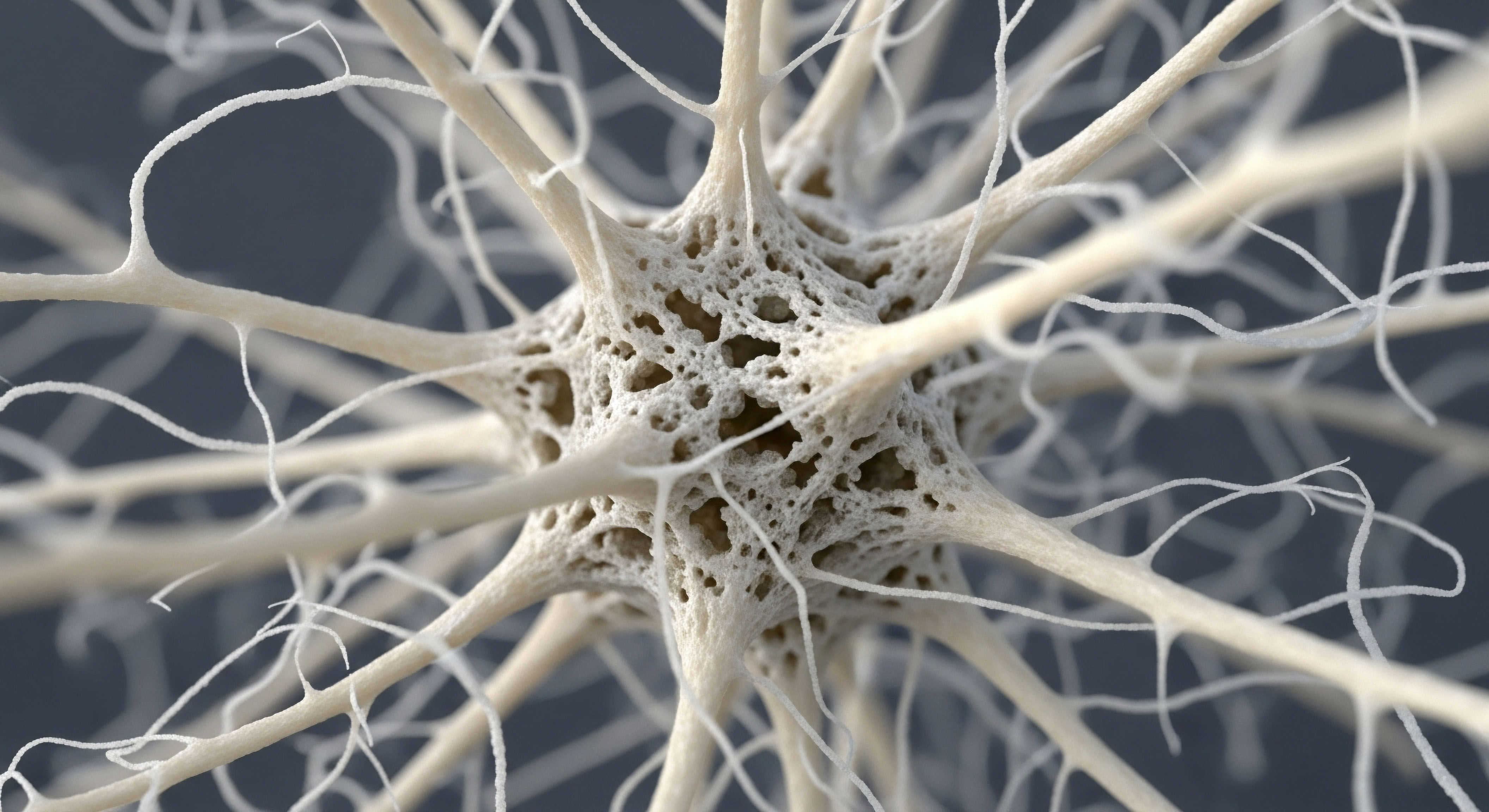

The Mind’s Physical Foundation
Consider the subtle shifts in mental agility as years accumulate, the moments when recall falters or decision-making demands greater effort. This experience is a common narrative, yet it represents a departure from our innate capacity for crisp, swift thought.
The contemporary world, with its relentless demands, places an unprecedented premium on mental acuity, on the ability to process information at speed. We desire clarity, decisive action, and sustained cognitive stamina. A deeper understanding reveals that intellectual vigor is inextricably linked to the intricate biochemical symphony within the body. Mental sharpness is not merely a product of abstract intellect; it arises from a finely tuned biological system.
Many individuals observe a gradual dimming of their internal light, a lessened capacity for sustained focus or innovative problem-solving. This decline manifests as difficulty retrieving information quickly, a diminished drive, or an unexpected mental fatigue. Such signals are frequently misattributed to the inevitable march of time, viewed as an unavoidable consequence of aging.
However, this perspective overlooks the profound impact of internal physiology on cognitive performance. The body’s state determines its capacity to support the brain’s highest functions, acting as the ultimate hardware for complex neurological processes.
True mental performance, therefore, requires a strategic investment in the underlying biological architecture. Optimal brain function depends upon robust hormonal signaling, efficient cellular energy production, and systemic physiological balance. When these foundational elements are optimized, the brain operates at its peak, facilitating rapid thought, enhanced memory, and resilient mental endurance. Ignoring these physical components restricts the very intellectual potential we seek to maximize. This proactive approach shifts the focus from managing cognitive decline to actively engineering a superior mental state.
Sustained intellectual vigor directly correlates with a meticulously optimized internal biological system, moving beyond mere age-related decline.
The aspiration to maintain a competitive edge, to lead with conviction, or to simply enjoy life with undiminished mental clarity is universally shared. Achieving this requires acknowledging the body as the ultimate conduit for mental prowess. Imagine a biological system where every neuron fires with precision, where neurotransmitter pathways operate with peak efficiency, and where mental fatigue becomes a distant concept.
This is the domain of biological optimization, where science-backed protocols re-establish the conditions for superior cognitive output. Our physical state profoundly dictates our capacity for rapid thought, innovation, and mental resilience, acting as the fundamental support for all higher-level cerebral activities.
The desire for sustained peak performance means recognizing the body as the ultimate high-performance machine. Any reduction in its operational efficiency inevitably influences mental output. This connection explains why fatigue, subtle hormonal shifts, or metabolic imbalances often manifest first as cognitive performance blockers. Reclaiming mental velocity involves targeting these root physiological causes, rather than accepting intellectual stagnation. The time for a new dialogue on cognitive health has arrived, one that prioritizes proactive intervention over passive acceptance.


Orchestrating Cognitive Velocity
Achieving cognitive velocity, the capacity for swift, clear thought, involves tuning the body’s deepest chemical communications. Consider the body a sophisticated, interconnected ecosystem where hormones and peptides serve as the master signals, directing cellular behavior across every system. Optimal brain function relies heavily on this internal signaling network. When these signals are balanced and robust, the brain receives the optimal conditions for high-speed processing and resilient mental endurance. This process calibrates the entire system for peak mental output.
Specific biological agents are instrumental in recalibrating this intricate system. Testosterone, for instance, influences more than just muscle mass and drive; it directly impacts neural pathways governing focus, spatial memory, and processing speed. Its presence supports neurogenesis in critical brain regions, contributing to sustained mental agility. Women, similarly, gain significant cognitive advantages from balanced estrogen levels, which offer neuroprotective benefits and enhance cerebral blood flow. These foundational hormones establish a robust environment for thought.

Hormonal Signals for Mental Strength
- Testosterone’s influence extends to mental clarity and decisiveness. It supports the synthesis of key neurotransmitters and maintains neuronal health, facilitating quicker thought patterns. Optimized levels correlate directly with enhanced problem-solving capabilities and sustained attention spans.
- Estrogen contributes profoundly to brain health and cognitive function, particularly in memory consolidation and mood regulation. Its neuroprotective properties safeguard brain cells, preserving mental sharpness and reducing cognitive decline.
- Thyroid hormones orchestrate cellular metabolism throughout the body, including the brain. Insufficient thyroid activity can lead to widespread cognitive sluggishness, affecting speed of thought, memory, and concentration. Fine-tuning thyroid function restores metabolic efficiency, invigorating mental processes.
- Growth Hormone and its mediator, IGF-1, play a significant role in neurogenesis and synaptic plasticity. These agents support the creation of new neural connections and strengthen existing ones, fostering learning, memory, and adaptive thought processes.
Beyond traditional hormones, targeted peptide protocols represent a pioneering frontier in cognitive enhancement. Peptides are short chains of amino acids that act as highly specific biological messengers, delivering precise instructions to cells. Their application allows for nuanced physiological adjustments, promoting mental resilience and accelerating thought. They offer a refined method for guiding the body toward superior cognitive states.

Peptide Protocols for Mental Acuity
Peptides provide a unique advantage by targeting specific cellular pathways that govern brain health and function. These compounds can promote neurogenesis, reduce neuroinflammation, and optimize neurotransmitter balance, directly influencing the speed and clarity of thought.
- Brain-Derived Neurotrophic Factor (BDNF) Stimulation ∞ Peptides such as Cerebrolysin or specific growth hormone-releasing peptides can encourage the body’s natural production of BDNF, a protein vital for neuronal survival, growth, and synaptic plasticity. Increased BDNF levels correlate with enhanced learning, memory formation, and mental resilience.
- Neurotransmitter Optimization ∞ Certain peptides influence the delicate balance of neurotransmitters. Selank, for example, modulates the levels of GABA and serotonin, promoting mental calm without sedation, thereby sharpening focus and reducing anxiety-induced cognitive interference. Semax similarly supports dopamine and serotonin pathways, enhancing attention and mental energy.
- Cellular Energy Production ∞ Mitochondrial health is paramount for brain function, as neurons are highly energy-dependent. Peptides like Epitalon influence cellular aging and energy production, while others might support antioxidant defense mechanisms within brain cells, ensuring a consistent and robust energy supply for rapid thought.
- Inflammation Modulation ∞ Chronic low-grade inflammation can impair cognitive function. Specific peptides possess anti-inflammatory properties that can protect neural tissue from damage and optimize the microenvironment for cognitive processes. Reducing systemic inflammation directly benefits brain clarity and processing speed.
The application of these protocols requires precision and a personalized strategy. Each individual’s unique biochemical blueprint dictates the optimal combination and dosage. Advanced diagnostics, including comprehensive hormone panels and metabolic assessments, provide the data required to design a truly individualized optimization plan. This data-driven approach transforms general wellness aspirations into tangible, measurable improvements in cognitive function.
Strategic hormonal and peptide recalibration precisely fine-tunes the body’s intrinsic signaling, directly elevating cognitive processing speed and mental resilience.
Implementing these strategies represents an intelligent investment in one’s future self. It signifies a transition from passively experiencing life’s mental challenges to actively shaping a more vibrant, high-performing cognitive existence. The focus remains on systemic balance, ensuring that all components of the body’s complex network contribute to an uncompromised state of mental acuity. This systematic intervention paves the way for a sustained cognitive advantage in every aspect of life.


The Moment of Cognitive Reawakening
Recognizing the opportune moment to initiate a proactive cognitive optimization protocol is a crucial step in personal evolution. Many individuals experience subtle yet persistent signals that their mental edge is diminishing. These manifestations extend beyond occasional forgetfulness, appearing as a consistent lack of mental stamina, prolonged decision fatigue, or a general reduction in the speed of thought. When these signals become recurring performance blockers, it indicates a prime opportunity for intervention, a moment for biological recalibration.
The decline in vital hormone levels frequently commences earlier than many anticipate, often in the late twenties and thirties, accelerating through the forties and beyond. These shifts are often imperceptible at first, masquerading as routine stress or lifestyle factors. However, the cumulative effect manifests as a perceptible drag on cognitive function and overall vitality.
Observing changes in drive, mood stability, or even physical recovery alongside mental fogginess suggests a systemic shift, one demanding a strategic response. This recognition forms the initial impetus for exploration.

Recognizing the Readiness for Recalibration
Consider these markers as invitations to explore advanced optimization strategies:
- Persistent Mental Lag ∞ A feeling that your brain is operating at a slower pace, requiring more effort to grasp new concepts or formulate responses.
- Decision Fatigue ∞ Experiencing exhaustion from making choices, even minor ones, leading to procrastination or poor judgment.
- Diminished Focus ∞ Finding it challenging to sustain attention on complex tasks or experiencing frequent mental wandering.
- Reduced Mental Resilience ∞ A heightened susceptibility to stress affecting cognitive performance, making it harder to bounce back from intellectual demands.
- Subtle Memory Lapses ∞ More frequent occurrences of “tip-of-the-tongue” moments or difficulty recalling names or details.
These are not isolated occurrences; they represent interconnected signals from a system that requires fine-tuning. Acting on these early indicators allows for a preemptive approach, re-establishing optimal physiological conditions before significant decline takes root. The timeline for observing benefits from these protocols is also an important consideration, influencing the commitment to a tailored regimen.

Anticipating the Transformation
The effects of hormonal and peptide optimization typically unfold systematically, reflecting the body’s gradual recalibration. Initial improvements in energy and mood often appear within weeks, setting the stage for more profound cognitive enhancements. Increased mental clarity, enhanced focus, and improved sleep quality usually follow, contributing to a more robust mental landscape. Full cognitive benefits, including sustained rapid thought and heightened problem-solving abilities, generally become markedly apparent over several months. This progressive transformation reinforces the power of systemic optimization.
Individual responses vary, influenced by starting biochemistry, lifestyle, and adherence to the protocol. Consistent monitoring through advanced biomarker analysis ensures the program remains precisely aligned with your evolving physiological needs. This iterative process guarantees sustained progress and maximal benefit, continuously refining the blueprint for peak mental performance. The journey is an ongoing partnership with your own biology.
Initiating biological recalibration when early signals of cognitive decline manifest unlocks a profound reawakening, with tangible mental benefits unfolding systematically.
This approach transcends reactive measures; it embodies a proactive mastery of your biological destiny. It represents an intelligent decision to invest in your most valuable asset ∞ your cognitive capacity. The precise moment to begin is when the desire for uncompromised mental function outweighs any lingering hesitation. This is the opportunity to forge a future where your mind operates with unparalleled speed, precision, and endurance. The path to a sharper mind begins with a strategic physical optimization.

Beyond Limits, beyond Measure
You possess the intricate capacity to redefine your biological baseline, transforming what might feel like an inevitable decline into a deliberate ascent. This understanding of the body’s profound influence on rapid thought is not simply knowledge; it is an operating manual for self-mastery. The journey toward unparalleled cognitive performance is a testament to precision and purpose. It represents a conscious decision to engage with your biology, to sculpt it, and to elevate its inherent capabilities.
Consider the words of Viktor Frankl ∞ “Everything can be taken from a man but one thing ∞ the last of the human freedoms ∞ to choose one’s attitude in any given set of circumstances, to choose one’s own way.” While Frankl spoke of the spirit, we now apply this principle to the physical realm.
The power to choose optimization, to demand more from your own biology, stands as a fundamental freedom in a world that seeks to diminish it. Your path forward involves conscious design, not passive acceptance.
This pursuit of peak mental and physical vitality is an ongoing dialogue with your own potential. It invites continuous refinement, leveraging scientific advancements to extend the boundaries of what is possible. Your optimized self, operating with heightened clarity and sustained vigor, reshapes every experience. The future of human capability unfolds through these deliberate, science-backed interventions. Your cognitive destiny awaits its ultimate architect ∞ you.



